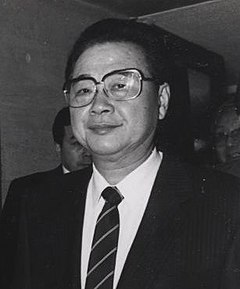Li Peng
| Li Peng | |
|---|---|
| 李鹏 | |
 |
|
| Premier of the People's Republic of China | |
|
In office 25 March 1988 – 17 March 1998 acting from 24 November 1987 |
|
| President |
Yang Shangkun Jiang Zemin |
| Vice Premier |
Cabinet I (1988–93)
Cabinet II (1993–98)
|
| Preceded by | Zhao Ziyang |
| Succeeded by | Zhu Rongji |
| Chairman of the Standing Committee of the National People's Congress | |
|
In office 15 March 1998 – 15 March 2003 |
|
| Preceded by | Qiao Shi |
| Succeeded by | Wu Bangguo |
| Member of the 13th, 14th, 15th CPC Politburo Standing Committee | |
|
In office 2 November 1987 – 15 November 2002 |
|
| General Secretary |
Zhao Ziyang Jiang Zemin |
| Vice Premier of the People's Republic of China | |
|
In office 6 June 1983 – 24 November 1987 Serving with Wan Li, Yao Yilin, Tian Jiyun |
|
| Premier | Zhao Ziyang |
| Member of the National People's Congress |
|
|
In office 25 March 1988 – 5 March 2003 |
|
| Constituency | Beijing At-large |
| Personal details | |
| Born |
20 October 1928 Shanghai, Republic of China |
| Nationality | Chinese |
| Political party | Communist Party of China |
| Spouse(s) | Zhu Lin |
| Children |
Li Xiaopeng Li Xiaolin Li Xiaoyong |
| Alma mater | Moscow Power Engineering Institute |
| Profession | Politician civil engineer |
| Li Peng | |||||||||||||||||||

"Li Peng" in Simplified (top) and Traditional (bottom) Chinese characters
|
|||||||||||||||||||
| Simplified Chinese | 李鹏 | ||||||||||||||||||
|---|---|---|---|---|---|---|---|---|---|---|---|---|---|---|---|---|---|---|---|
| Traditional Chinese | 李鵬 | ||||||||||||||||||
|
|||||||||||||||||||
| Transcriptions | |
|---|---|
| Standard Mandarin | |
| Hanyu Pinyin | Lǐ Péng |
| Wade–Giles | Li3 P'eng2 |
| IPA | [lì pʰə̌ŋ] |
| Yue: Cantonese | |
| Jyutping | Lei5 Paang4 |
| Southern Min | |
| Hokkien POJ | Lí Pîng |
Li Peng (Chinese: 李鹏; pinyin: Lǐ Péng; born 20 October 1928) served as the fourth Premier of the People's Republic of China, between 1987 and 1998, and the Chairman of the Standing Committee of the National People's Congress, China's top legislative body, from 1998 to 2003. For much of the 1990s Li was ranked second in the Communist Party of China (CPC) hierarchy behind then Party General Secretary Jiang Zemin. He retained his seat on the CPC Politburo Standing Committee until 2002.
Li was the son of an early Communist revolutionary, but was orphaned as a child when his father was executed by the Kuomintang. After meeting Zhou Enlai in Sichuan Li was raised by Zhou and his wife, Deng Yingchao. Li was trained to be an engineer in the USSR and worked at an important national power company after he returned to China. He escaped the political turmoil of the 1950s, '60s, and '70s due to his political connections and his employment in the company. After Deng Xiaoping became China's leader in the late 1970s, Li took a number of increasingly important and powerful political positions, eventually leading to him becoming premier in 1987.
As Premier, Li was the most visible representative of China's government who backed the use of force to quell the Tiananmen Square protests of 1989. During the protests Li used his authority as premier to declare martial law; and, in cooperation with Deng Xiaoping, who was the Chairman of the Central Military Commission, he ordered the June 1989 military crackdown against student pro-democracy demonstrators in Tiananmen Square, Beijing. Li advocated a largely conservative approach to Chinese economic reform, which placed him at odds with General Secretary Zhao Ziyang, who fell out of favour in 1989. After Zhao was removed from office Li promoted a conservative socialist economic agenda, but lost influence to incoming vice-premier Zhu Rongji and was unable to prevent the increasing free-market liberalization of the Chinese economy. During his time in office he was at the helm of the controversial Three Gorges Dam project. He and his family managed a large Chinese power monopoly, which the Chinese government broke up after his term as premier expired.
...
Wikipedia
